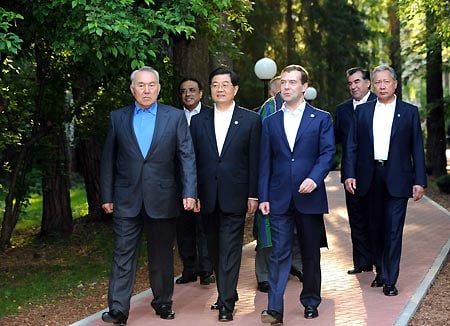
My colleague David Kampf pointed out that the BRIC leaders are meeting tomorrow in Yekaterinburg, Russia. Before the BRIC meeting, however, an equally important and significant meeting took place today in the same location. The six heads of state of the Shanghai Cooperation Organization (SCO) met for a small summit. The summit will continue tomorrow alongside BRIC meetings. While the BRIC is looking to challenge the G7, the SCO (consisting of Russia, China, Kazakhstan, Kyrgyzstan, Tajikistan and Uzbekistan) is a foil to NATO, and it is growing in its regional scope and influence. This year the SCO Sri Lanka and Belarus in as official “dialogue partner” nations. (Mongolia, Pakistan, India and Iran already hold “observer” status, and Iran has submitted an application to officially join the SCO).
Just as the financial crisis is the main focus of the BRIC meeting, so it is for the SCO summit. Security is also a central issue. A great deal seems to have been accomplished already over the development of the summit. Russia used the opportunity to play diplomat and peacemaker, holding a meeting for Afghan President Hamid Karzai and Pakistani Prime Minister Asid Ali Zardari. The two leaders along with President Medvedev formed a “united front against terror“. (Some have pointed out that Moscow seeks a greater role in Afghanistan.) Indian Prime Minister Manhoman Signh and Pakistani PM Zardari are also scheduled to meet – for the first time since after the November Mumbai terror attacks. As expected, the economic powerhouse of Chine has profited and will continue to profit the most from the SCO. China and Uzbekistan pledged closer colloration and cooperation on “trade, economy, energy, security and culture.” Beijing also reinforced its already strong ties with Kyrgyzstan. Iranian President Mahmoud Ahmadinejad is expected to attend, but has delayed his trip due to public discontent regarding his recent reelection.
While all these economic and diplomatic ventures are unquestionably beneficial and expected, one key element has been missing from commentary concerning the SCO meeting: North Korea. Given Pyongyang’s recently restated belligerent nuclear stance, one would expect Russia and China in particular to express more concern, especially in the forum of the SCO which is, as stated in its mission statement, an organization devoted to mutual security. The most specific discussion I have found of the North Korea issue is in the Russian news source ITAR-TASS, which explains that North Korea is on the agenda but that the SCO will not produce a report on it.
On a slightly unrelated note, Foreign Policy’s Andrew Weiss, wrote a feature today on the BRIC summit, painting Russia as the “odd man out” because of its floundering economic clout.
Photo: Xinhua.